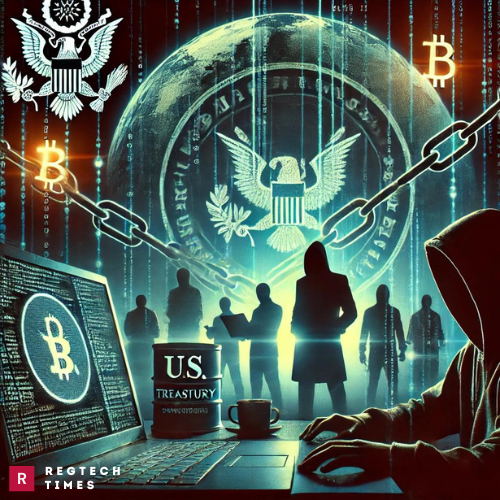In a major effort to combat international cybercrime, the United States has indicted two prominent Russian hackers and imposed sanctions on cryptocurrency exchanges allegedly involved in money laundering for cybercriminals. These actions are part of a broader crackdown aimed at disrupting the financial networks that support illegal online activities.
The Indictment of Russian Hackers: Sergey Ivanov and Timur Shakhmametov
On Thursday, the U.S. Department of Justice unveiled an indictment charging two Russian hackers, Sergey Sergeevich Ivanov and Timur Shakhmametov, with conspiracy to commit bank fraud and money laundering. Ivanov is accused of using stolen credit and debit card information to facilitate illegal transactions on a global scale. His services have reportedly been used by ransomware groups, cybercriminal marketplaces, and hackers responsible for significant data breaches targeting major U.S. companies.
Shakhmametov faces similar charges, with both Russian hackers believed to be key players in sophisticated cybercriminal networks. These hackers provided the infrastructure that allowed cybercriminals to conduct complex financial fraud schemes, ultimately profiting from the exploitation of vulnerable digital systems.
Sanctions Target Cryptex and PM2BTC: Disrupting Cybercrime’s Financial Networks
In a coordinated action, the U.S. Treasury Department imposed sanctions on Cryptex, a cryptocurrency exchange operating out of Saint Vincent and the Grenadines but primarily serving clients in Russia. Cryptex is alleged to have played a crucial role in laundering money for Russian hackers and other cybercriminals involved in ransomware attacks and stolen credit card operations.
In addition, the Treasury’s Financial Crimes Enforcement Network (FinCEN) identified PM2BTC, another Russian cryptocurrency exchange linked to Ivanov, as a “primary money laundering concern.” FinCEN emphasized that PM2BTC used sophisticated methods to obscure illegal transactions, making it difficult to trace the flow of illicit funds. This exchange had long-established ties to Russian financial institutions that were already subject to U.S. sanctions.
The sanctions against Cryptex and PM2BTC are designed to disrupt the financial systems that allow Russian hackers to profit from their cybercriminal activities. By targeting the exchanges that facilitate these transactions, the U.S. aims to weaken the infrastructure that enables cybercrime.
The Geopolitical Context: Cybercrime and Russia’s Global Role
The actions against these Russian hackers occur against the backdrop of rising tensions between the U.S. and Russia, especially following Russia’s invasion of Ukraine in February 2022. Since the start of the war, the U.S. and its allies have imposed sanctions on thousands of Russian individuals and entities. These sanctions aim not only to pressure the Russian government economically but also to dismantle criminal networks that operate within Russia.
Aleksejs Haļavins: The Latvian Trader Behind Russia’s Oil Sanctions Evasion
Russian hackers have been at the forefront of some of the most damaging cyberattacks in recent years. Ransomware attacks, large-scale data breaches, and financial frauds linked to Russia have cost U.S. companies billions of dollars and posed serious national security threats. By imposing sanctions and indicting key figures like Ivanov and Shakhmametov, the U.S. is sending a strong message that cybercrime will not be tolerated, and the perpetrators will be held accountable.
Rewards for Information: Incentivizing Whistleblowers
In a further effort to combat cybercrime, the U.S. State Department has announced rewards of up to $10 million for information leading to the arrest or conviction of Russian hackers Ivanov and Shakhmametov. The State Department has also offered rewards of up to $1 million for information identifying the leaders of illicit marketplaces such as PinPays and Joker’s Stash, which specialize in stolen credit card information.
These financial incentives are part of a larger international collaboration aimed at dismantling global cybercrime networks. By encouraging whistleblowers to come forward, the U.S. hopes to gather vital information that will lead to the arrest of Russian hackers and their accomplices, further disrupting their operations.
Implications for Global Cybersecurity
The U.S. government’s actions against Russian hackers and their associated cryptocurrency exchanges represent a significant escalation in the global fight against cybercrime. Cryptocurrencies have been a favored tool for cybercriminals due to their relative anonymity, making it easier for Russian hackers to launder money and evade detection. By sanctioning these exchanges, the U.S. seeks to close off key financial channels that support illegal activities.
These measures are not only about protecting the U.S. economy but also about safeguarding global financial systems from abuse by cybercriminals. The sanctions against Cryptex and PM2BTC send a clear message to cryptocurrency platforms worldwide: facilitating money laundering for cybercriminals will lead to severe consequences.
The indictment of Russian hackers Sergey Ivanov and Timur Shakhmametov, along with the sanctions on Cryptex and PM2BTC, mark a significant step in the U.S. government’s efforts to combat cybercrime. These actions highlight the importance of targeting both the individuals responsible for cyberattacks and the financial networks that enable their activities. As cybercrime continues to evolve, international cooperation and decisive actions like these will be essential in the ongoing fight to protect global digital and financial security.


